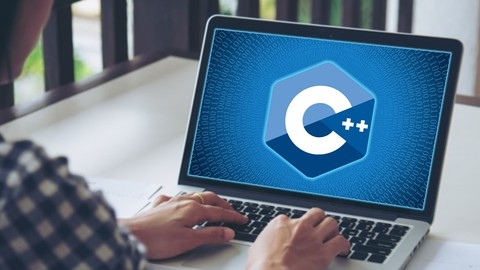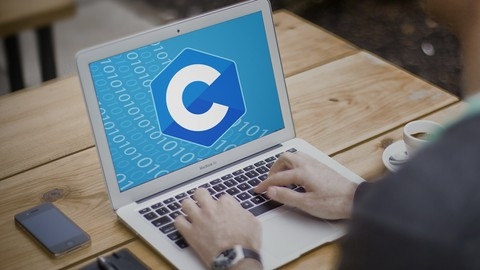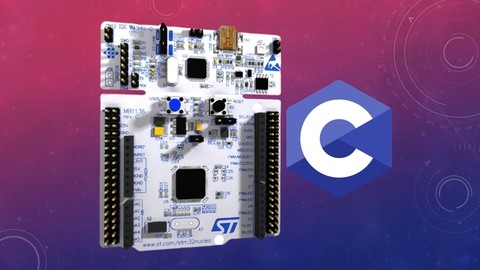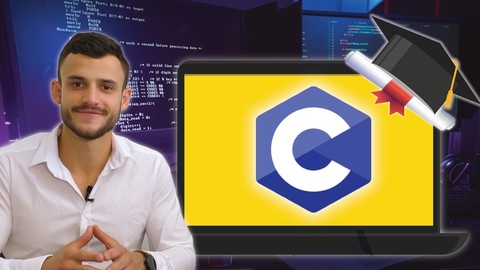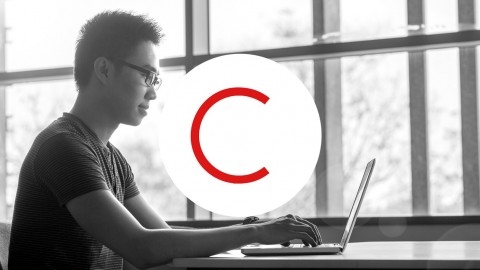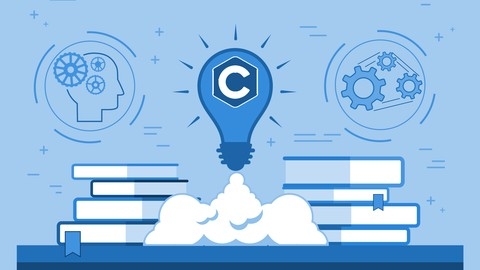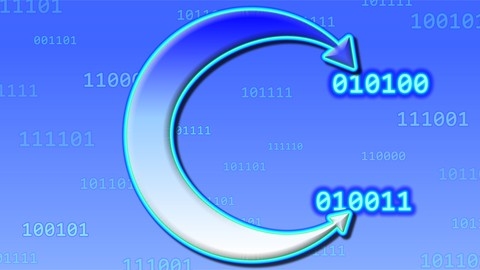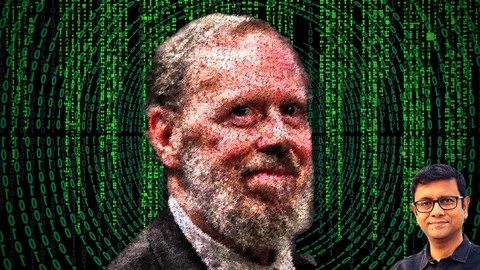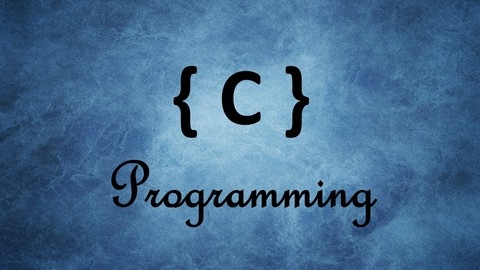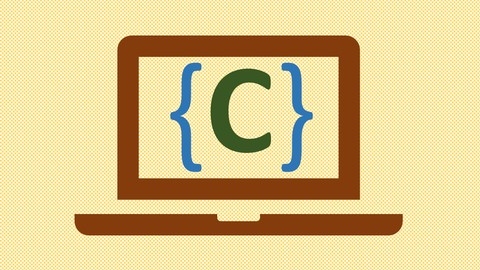C is a foundational language that powers everything from operating systems to game engines.
It’s a highly versatile language known for its efficiency and control over system resources.
Mastering C opens doors to diverse career paths in software development, embedded systems, and more.
Learning C can be a rewarding but challenging journey.
Finding a course that truly delivers on its promises and effectively guides you through the complexities of this language is crucial.
You want a course that’s both comprehensive and engaging, with experienced instructors who can break down complex concepts into digestible chunks.
We’ve sifted through countless C programming courses on Udemy and have chosen "Beginning C++ Programming - From Beginner to Beyond" as the best overall course.
This course stands out for its thoroughness, covering everything from basic syntax to advanced topics like object-oriented programming and the Standard Template Library.
The instructor provides clear explanations and practical examples, ensuring you can apply your knowledge to real-world projects.
This is just the start of our curated list of C programming courses on Udemy.
We’ve got recommendations for all levels of learners, from absolute beginners to those looking to deepen their expertise.
Whether you’re interested in specific C libraries, system programming, or even game development, we’ve got the perfect course for you.
Keep reading to explore our full list and find the ideal C programming course to fuel your learning journey.
Beginning C++ Programming - From Beginner to Beyond
This course guides you through the essentials of C++, including its modern standards and the process of creating and executing programs.
It starts with a clear introduction to C++, highlighting its importance and setting you up with a FAQ section to address initial queries.
The course ensures you’re well-equipped from the get-go, providing detailed instructions on setting up the C++ compiler and the CodeLite IDE across Windows, Mac OSX, and Ubuntu Linux.
It emphasizes the command-line interface, a critical skill for compiling and running C++ programs.
As you progress, the course introduces you to writing and building your first programs, tackling compiler errors, and understanding different error types such as linker and runtime errors.
This foundational knowledge is crucial for any budding programmer.
Diving deeper, the course explores the structure of C++ programs, variables, constants, arrays, vectors, and the intricacies of statements and operators.
Each section is reinforced with quizzes and challenges, ensuring you grasp the material thoroughly.
A significant focus is placed on Object-Oriented Programming (OOP), where you’ll learn about classes, objects, access specifiers, member methods, constructors, and destructors.
This section is vital for applying C++ in software development.
Advanced topics such as operator overloading, inheritance, and polymorphism are also covered, elevating your C++ skills and enabling you to write more efficient code.
The course doesn’t stop there; it delves into smart pointers and exception handling, teaching you about unique, shared, and weak pointers, and how to manage exceptions in your programs effectively.
The Standard Template Library (STL) is another highlight, where you’ll explore containers, iterators, and algorithms, showcasing the power of C++.
For those interested in input/output operations, the course offers comprehensive insights into file handling, stream manipulators, and reading and writing to text files, essential for any real-world C++ application.
Lambda expressions are also introduced, teaching you how to write concise and functional code using both stateless and stateful lambda expressions with the STL.
Bonus sections on using Visual Studio Code for C++ development and a deep dive into enumerations are included, along with extra resources like source code access and a free programming eBook.
C Programming For Beginners - Master the C Language
The journey begins with an introduction to programming basics and the C language, including creating your first C program.
Early on, a quiz helps gauge your understanding, setting a solid foundation.
Installation of necessary software is streamlined, with guidance for Windows, Mac, and Ubuntu Linux users.
The course details how to set up the C compiler and CodeLite, an IDE favored by C programmers, alongside instructions for those preferring the command line interface or a web-based compiler.
As you progress, the course dives into writing code, exploring the CodeLite environment, and guiding you through compiling and debugging your first program.
It clearly explains various errors you might encounter, such as compiler, linker, runtime, and logic errors, and includes practical challenges like creating a program to display your name.
Core C programming concepts are thoroughly covered.
You’ll learn about comments, preprocessors, input/output operations, and basic data types.
Engaging challenges, such as calculating the area of a rectangle or converting minutes into years, reinforce your learning.
The course also demystifies control flow, teaching you about if statements, switch statements, loops, and nested loops through practical examples like a weekly pay calculator or a “Guess the Number” game.
Key programming constructs like arrays, functions, character strings, and debugging are comprehensively explored.
You’ll tackle creating arrays, understanding functions, manipulating character strings, and mastering debugging techniques.
The course ensures you’re equipped to handle dynamic memory allocation with malloc, calloc, and realloc, enhancing your programming flexibility.
Pointers, often a challenging concept for beginners, are made accessible.
You’ll learn to define, access, and utilize pointers, including pointer arithmetic and using pointers with functions and structures.
The course doesn’t stop there; it delves into structures, file input/output, and the Standard C Library.
From creating structures to reading and writing files, and leveraging library functions, you’re guided through practical applications and challenges.
By the end, you’ll not only grasp the fundamentals but also understand advanced topics like structures and pointers.
Microcontroller Embedded C Programming: Absolute Beginners
This course guides you from the basics of C programming to the intricacies of embedded systems, making it ideal if you’re new to programming or looking to expand your skills into the embedded domain.
The course begins with an introduction to C programming, highlighting its significance in embedded systems.
You’ll explore the history of C and its standardization, setting a strong foundation.
The journey continues with setting up your development environment, where you’ll install the STM32CubeIDE, compatible with Windows, Linux, and Mac.
This IDE is pivotal for programming STM32 microcontrollers, a key focus of the course.
As you progress, the course covers fundamental programming concepts like data types, variables, and operators through engaging exercises, including the iconic “Hello World”.
These initial steps are crucial for grasping the basics of C programming.
A significant portion of the course is dedicated to understanding and programming microcontrollers, specifically the ARM Cortex M4.
You’ll learn to perform tasks such as LED manipulation and button input reading, providing a hands-on experience that bridges theory with practical application.
Advanced topics are not overlooked.
You’ll delve into storage classes, functions, pointers, and floating-point data manipulation.
The course also teaches you how to interact with users through input, manage arrays and strings, and utilize pre-processor directives for efficient coding.
Embedded C coding exercises are a highlight, offering real-world applications of your learning.
From controlling LEDs to keypad interfacing, these exercises not only reinforce your knowledge but also prepare you for creating your own embedded projects.
The course thoroughly covers ‘volatile’ and ‘const’ type qualifiers, bitwise operators, looping, structures, unions, and bit-fields.
These concepts are essential for writing effective embedded C code, managing data, and understanding microcontroller architecture.
C Programming Bootcamp - The Complete C Language Course
This course guides you from the basics to advanced concepts of C programming, ensuring a solid foundation and practical proficiency.
The journey begins with an introduction to the programming fundamentals, where you’ll learn about variables, data types, and control flow.
The course is structured to make complex topics like pointers, strings, and recursion accessible and understandable, thanks to clear animated explanations.
Setting up your development environment is a critical first step, and this course provides detailed instructions for selecting and installing the appropriate Integrated Development Environment (IDE) across Windows, Linux, Mac OS, or online compilers.
This ensures you’re well-equipped to start coding in C, regardless of your operating system.
As you advance, the course covers arrays, matrices, structs, and unions, complemented by over 100 practical exercises and challenges.
These hands-on activities are designed to reinforce your learning and simulate real-world programming scenarios, preparing you for actual problem-solving in the tech industry.
Real-world applications are a focus, with projects like building calculators and weather stations that not only solidify your understanding but also showcase your skills in practical settings.
Additionally, the course prepares you for the job market with a section dedicated to common interview questions, enhancing your readiness for technical interviews.
Moreover, the course delves into binary, hex, and ASCII, offering a deep dive into data representation and manipulation.
With extra content on working with files and extensive exercises on strings, recursions, and more, you’ll emerge with a comprehensive skill set that’s in high demand.
C Programming For Beginners
The journey begins with an introduction to C, highlighting its significance as a cross-platform language.
You’ll quickly move on to setting up your programming environment, with detailed instructions on using CodeLite, a preferred IDE for this course.
Alternatives like C++Builder and NetBeans are also explored, catering to diverse preferences and prior experiences.
Your first steps in C programming involve crafting a simple “Hello world” program, paving the way to more intricate topics such as variables, types, and constants.
Each section concludes with quizzes, ensuring you’ve mastered the concepts before progressing.
The curriculum delves into operators, user input, and making decisions with if-else tests, equipping you to create interactive programs.
You’ll then explore functions and switch statements, enhancing your ability to write well-structured code.
Arrays and loops are next, teaching you to manage data sequences efficiently.
As you advance, the course introduces pointers, strings, and memory management—key areas where C offers remarkable flexibility and control.
You’ll also learn about structs, enums, and header files, crucial for organizing complex programs.
File handling is a critical skill you’ll acquire, enabling you to interact with text and binary files, an essential aspect of many C projects.
The course culminates in a project that consolidates your learning, involving a CD database that utilizes structs and file I/O operations.
Throughout your learning journey, “The Little Book Of C” serves as a valuable resource, complementing the video lectures and source code examples to deepen your understanding.
Advanced C Programming Course
This course guides you through the latest in C programming, starting with an in-depth look at the C99 and C11 standards, ensuring you’re well-versed in modern C programming practices.
Setting up your development environment is made simple, regardless of whether you’re on Windows, Mac, or Ubuntu Linux.
The course walks you through installing the C Compiler and CodeLite, configuring your setup for optimal performance, and mastering the Command Line Interface.
For those who prefer online tools, it also introduces using a web-based C compiler, making sure you’re equipped to code in any setting.
The journey into coding begins with an exploration of the CodeLite environment, leading you to write and compile your first C program.
This foundational step paves the way for more complex programming tasks, including managing larger projects.
You’ll learn to compile multiple source files, utilize Makefiles, and understand file communication, setting a strong base for advanced development.
Diving deeper, the course covers storage classes, advanced data types, and type qualifiers, enriching your programming knowledge.
Topics such as bit manipulation, advanced control flow, and input/output operations are thoroughly explored, with practical challenges to apply what you’ve learned.
The curriculum extends to variadic functions, recursion, inline functions, and _Noreturn functions, complemented by hands-on challenges and demonstrations.
You’ll also gain expertise in using unions, mastering the preprocessor, creating macros, and leveraging advanced debugging techniques.
A significant portion of the course is dedicated to practical applications, including creating static and dynamic libraries, understanding useful C libraries like Assert and stdlib.h, and navigating complex data structures such as linked lists, stacks, queues, and binary trees.
Real-world programming skills are further developed through lessons on interprocess communication, signal handling, thread creation and synchronization, and networking with sockets.
Each module is designed to build your proficiency in creating robust, efficient C applications.
The course concludes with a detailed summary and provides additional resources, including source codes and bonus lectures, ensuring you have everything you need to continue your programming journey.
Advanced C Programming: Pointers
The course kicks off with the essentials, clarifying what pointers are, their relationship with addresses, and how to utilize pointer variables.
Through a series of lectures, quizzes, and study notes, it ensures you grasp the concept of indirection or dereferencing, a cornerstone in understanding pointer functionality.
Progressing further, the course delves into advanced topics such as the interplay between pointers and arrays, displaying pointer values, and the nuances of multiple indirection.
It thoroughly explores the use of pointers with various data types, including strings and structs, and demystifies pointer arithmetic.
Practical examples and debugging tips are plentiful, aimed at solidifying your understanding.
A highlight of the course is its extensive coverage of data structures.
You’ll learn the ins and outs of linked lists (both singly and doubly linked), and how they compare to arrays.
The course also navigates through the implementation of queues and stacks using pointers, equipping you with the skills to tackle more sophisticated programming tasks.
Recognizing the challenges pointers can present, the course addresses common issues such as deep and shallow copies, incorrect memory allocation, and the pitfalls of improper memory management.
These sections are designed to help you sidestep common errors and enhance your debugging skills.
The course concludes with an exploration of function pointers, shedding light on their declaration, usage, and the creation of function pointer arrays.
This segment cements your advanced understanding of pointers in C programming.
Supplementary materials, including source code archives, study notes, and FAQs, support your learning journey throughout the course.
C Programming Step by Step - Complete Tutorial For Beginners
Starting with an introduction, you’ll learn how to effectively navigate the course, use the Q&A forums, and tackle coding exercises.
This sets a solid foundation for your journey into C programming.
Setting up your development environment is made easy, regardless of whether you’re on a Mac or Windows.
The course covers the installation and use of compilers and IDEs like Xcode, Visual Studio Code, and Code::Blocks, preparing you to write, compile, and execute C programs efficiently.
The course then delves into C programming fundamentals.
You’ll explore “Hello, World!” programs, variables, data types, and operators through engaging lectures and quizzes.
This foundational knowledge is crucial for understanding more complex concepts later on.
As you progress, you’ll encounter essential programming constructs such as loops, arrays, and functions.
You’ll master controlling program flow with if-else statements and loops, and learn to organize code using functions.
The course also demystifies arrays, teaching you to manage collections of data effectively.
Advanced topics like pointers, file handling, and user-defined types, including structures, unions, and enums, are thoroughly covered.
You’ll learn to manipulate memory locations, handle files, and define your own types, broadening your programming capabilities.
Practical applications, including a Rock-Paper-Scissors game and implementing sorting algorithms, allow you to apply your knowledge in real-world scenarios.
These projects not only reinforce learning but also provide a glimpse into practical programming challenges.
The course doesn’t stop at the basics.
It ventures into advanced concepts such as recursion, storage classes, and bitwise operators, ensuring a deep understanding of C programming.
Additional modules on function pointers and using library functions equip you with the skills to tackle diverse programming tasks.
C Programming:The best approach to learn C Language
The course begins with an introduction to C programming, setting a clear path for your learning journey.
You’ll understand the prerequisites necessary to start, ensuring you’re fully prepared.
The course methodically introduces you to the core concepts of C programming, such as variables, data types, and operators.
These early lessons lay a solid foundation, with practical tasks to cement your understanding.
Moving forward, the curriculum dives into more complex topics like loop statements, functions, and program execution.
Each module includes hands-on tasks, allowing you to apply theoretical knowledge to real-world scenarios.
File handling and command line arguments come next, equipping you with the skills to manage files and utilize command line arguments effectively in C.
The course also covers arrays and character arrays, teaching you about their implementation and usage in detail.
A significant focus is placed on structures and memory management, including dynamic memory allocation.
You’ll learn about the malloc, calloc, free, and realloc functions, crucial for efficient memory management in C programming.
It introduces pointers and linked lists, explaining how to use pointers to create and manage singly, doubly, and circular linked lists.
Understanding these data structures is vital for advanced programming tasks.
String handling functions are also thoroughly explored, giving you the tools to manipulate strings in C effectively.
Additionally, the course covers essential data structures like stacks and queues, demonstrating their implementation in C.
Throughout the course, practical tasks and exercises are integrated, ensuring that you not only grasp the theoretical aspects but also gain hands-on experience.
C PROGRAMMING made easy
This course guides you from the basics to more advanced concepts, ensuring a solid foundation in C programming.
Starting with software installation, the course ensures you have all the necessary tools before diving into coding.
Your first milestone will be writing the iconic “Hello, World!” program, marking your entry into programming.
The journey continues with a deep dive into programming fundamentals, including data types, using printf and scanf for input and output, understanding format specifiers, and mastering operators.
These concepts are crucial as they form the backbone of C programming.
Next, control structures are introduced, teaching you how to direct the flow of your programs.
You’ll learn to make decisions using if, if..else, and switch case statements, and to iterate with for, while, and do while loops, including tackling nested loops for complex problem-solving.
The course also covers jump statements like break, continue, and goto, enhancing your ability to control program execution with precision.
Functions, including declaration, definition, and the intriguing concept of recursion, are thoroughly explained, empowering you to write reusable and efficient code.
Arrays and strings come next, equipping you with the skills to handle collections of data and text.
This section is pivotal for managing and manipulating data effectively.
Additionally, you’ll explore math functions, boosting your capability to perform calculations and process data.
A significant highlight is the segment on pointers and memory management, demystifying how C interacts with computer memory.
This includes understanding call by value versus call by reference and mastering efficient memory management techniques.
Structures and unions introduce you to organizing related data logically, while the final chapters on file handling teach you to read from and write to files, a vital skill for many programming tasks.
Also check our posts on:
